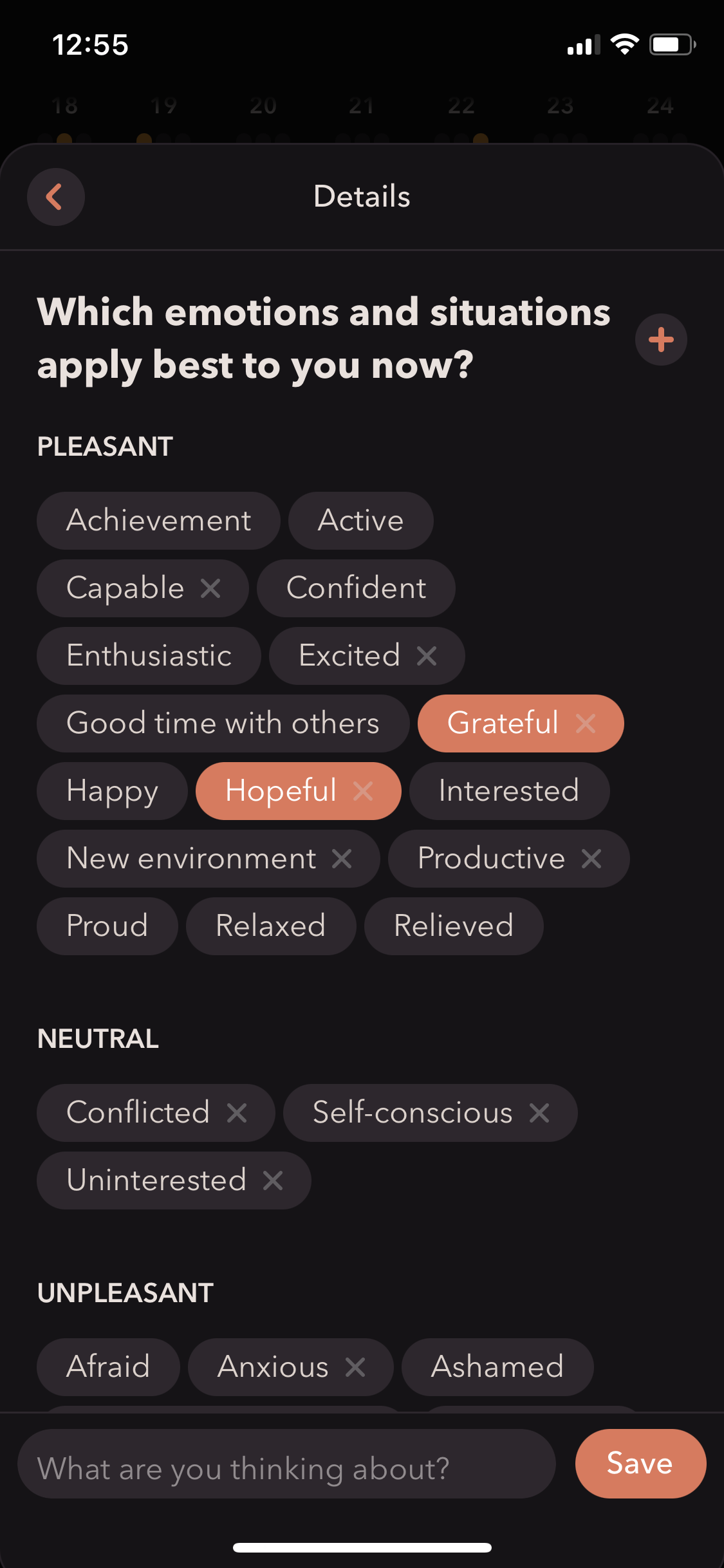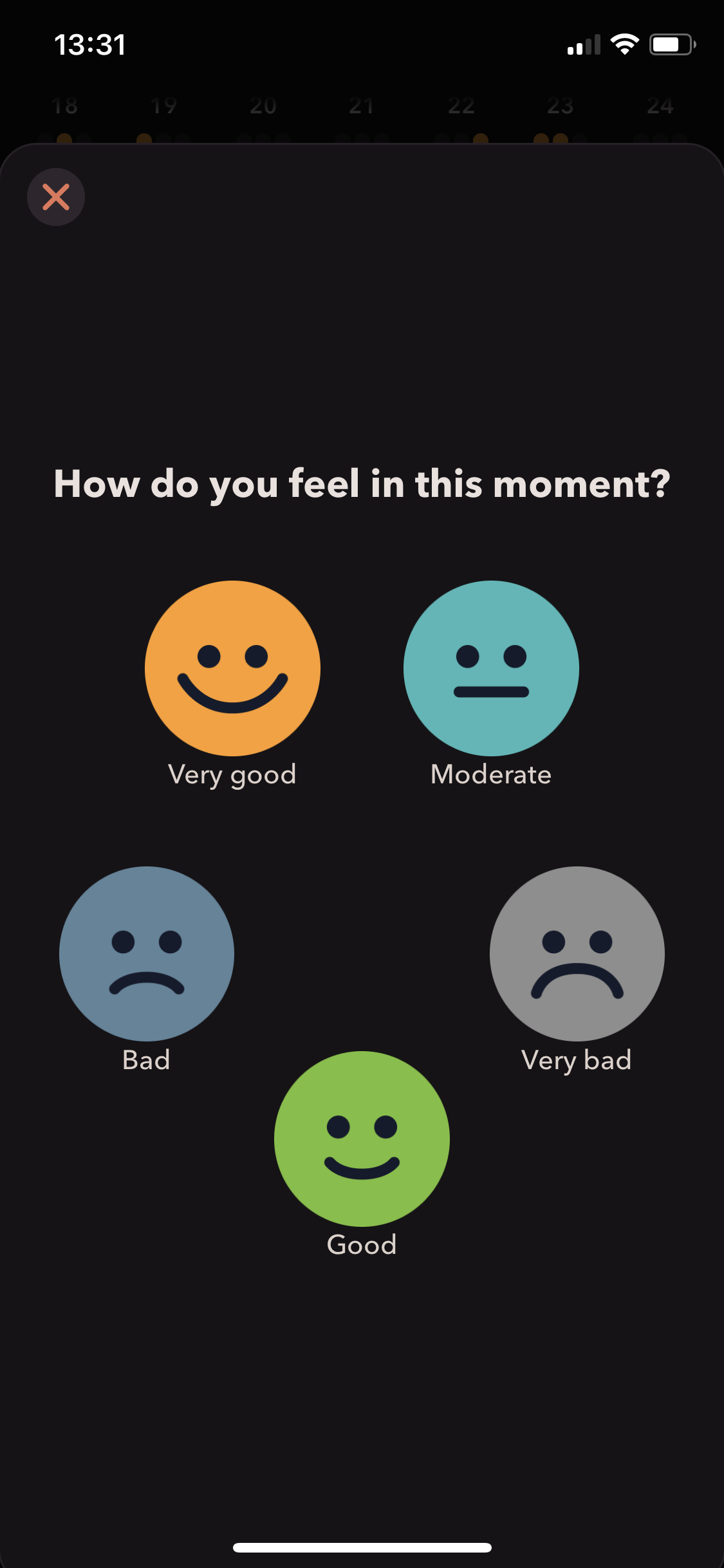How to Use the MindDoc App to Stick with Your New Years Resolutions to Prioritize Your Mental Health
/MindDoc is a mental health app that allows users to track their moods and emotions, recognize and identify patterns, and learn strategies for coping and self-managing symptoms and behaviors. This article describes how the MindDoc app can help you develop positive habits to prioritize your mental health and improve overall wellbeing. To learn more about how the app works and about my personal experience using MindDoc to track my mental health, click here to read my other blog article.
When you sign up for MindDoc, the app will prompt you three times throughout each day to answer a few questions on your current feelings about general situations and provide you with an opportunity to record your mood. Having used MindDoc personally for over a year, I’ve learned that the practice of doing so has become a habit that’s both positive and enlightening, as well as relatively easy and realistic to commit to. If your New Years resolution is to prioritize your mental health and you’re interested in signing up for MindDoc, use my code CARINA for a free one-week trial and 50% off a yearly subscription and continue reading to learn how it can help you this year.
1. Consistent prompts will keep your mental health at top of mind
The easiest way to fall behind when it comes to sticking to New Years resolutions is simply to forget. Because the MindDoc app is designed to prompt you multiple times throughout each day, you are consistently (yet unobtrusively) reminded to be aware of your current mental state, the things that you are excited about, and the things that may be contributing to your stress or anxiety. With consistent daily reminders to check in with yourself and your feelings, you will never forget to prioritize your mental health goals.
2. Encourage focus on what makes you happy
By keeping track of your moods and feelings as you go about your daily life, MindDoc can help you recognize patterns of positive emotions and situations, therefore encouraging more of the behaviors that inspired those emotions. For example, if you feel a sense of pride or relief when communicating your boundaries and give yourself recognition for it, you’re more likely to continue doing so in the future. By having a clear sense of what situations make you happy, it could also help you guide your decisions and make choices that are better for your overall wellbeing.
3. Bring awareness to situations that lead to negative emotions
Conversely, monitoring your mental wellbeing with the MindDoc app can also bring awareness to behaviors or situations that lead to negative emotions. Keeping track of and learning from the ways in which you react to stressful or overwhelming situations can help you in the future by managing your expectations and reducing general anxiety about some situations. MindDoc is an easy way to keep track of your emotions, and by giving yourself tangible examples of behaviors that you can learn from, you are more likely to stick with using it over periods of time.
4. Reinforce feelings of gratitude with constant reminders
Each time you respond to one of MindDoc’s prompts, you can indicate which feelings are most representative of your current mood in that moment, with each being categorized as pleasant, neutral, or unpleasant. The prompts offer a list of examples, but you can also customize the listed emotions to include others you feel may be more accurate. Within a few months of using MindDoc, I added a number of emotions that I felt best describe my feelings. Most notably, the emotions that I felt the strongest regardless of what I may have been experiencing at any given time were “Grateful” and “Hopeful”, so I added those to my list of MindDoc emotions. Consequently, I developed a habit of immediately selecting “Grateful” and “Hopeful” in addition to any other emotions that would apply in each moment that I respond to a MindDoc prompt, and I think over time they have continued to only reinforce those positive feelings.
5. Practice consistency over time
I personally credit any success I’ve ever experienced to being able to commit to doing something over long periods of time. I once read that it takes 3 months (90 days) of doing something repeatedly to develop a habit, and 6 months (180 days) of doing something repeatedly to build a lifestyle. The great thing about the MindDoc app is that you don’t even need to remember to use it because the automatic prompts will provide the reminders for you. By answering the MindDoc prompts daily over the course of a few weeks, then a few months, then eventually a few years, you will gain helpful insights into your personal mental wellbeing and will be encouraged to continue prioritizing your mental health. Additionally, by proving to yourself that you can remain committed and practice consistency overtime, you may also be encouraged to carry these good habits over to improve other areas of your life.
6. Monitor your progress over time
Each daily MindDoc prompt also gives you the opportunity to indicate how you are feeling overall, and assigns colors to the feelings of Very Good, Good, Moderate, Bad, and Very Bad. This creates a color-coded distribution of your moods in MindDoc’s calendar view, giving you the opportunity to see how your general mood is improving over time. The calendar view is also helpful to recognize patterns or determine if certain big events or milestones may have had an affect on your mental health. Especially if you’ve experienced something traumatic, and because progress is not linear, you can use the MindDoc app to monitor your progress over extended periods of time and reflect on how far you’ve come.
I’ve personally been able to use MindDoc to recognize patterns of my mood changing throughout my menstrual cycle, with increased levels anxiety arriving right on schedule each month. By having quantifiable data to support these findings, I’m better prepared to anticipate and minimize negative, anxious feelings before they even arise. Because this calendar view would not be as helpful or possible without consistent use of the MindDoc app, it has motivated me to continue using it so I can benefit from these insights.
7. It’s a helpful tool if you use or are considering traditional therapy
One of the great features of MindDoc is that it can work in tandem with traditional therapy with exportable reports you can choose to share, or by offering recommendations and guidance if your responses to the prompts indicate that traditional therapy could be beneficial to you. Using MindDoc is a great first step in taking your mental health matters into your own hands, and regardless of to which degree you are concerned with the state of your mental wellbeing, you can rest assured that using it regularly will serve as a helpful tool for prioritizing your mental health.
8. Access useful content and in-depth insights
If you are interested in learning more about certain mental health topics or discovering methods for improving your mood, the MindDoc app provides a wealth of courses and exercises in the form of reading and audio content. With new content being added to the app and improvements being made often, there is always something to discover and potentially offer a fresh perspective on something you’ve been seeking guidance on.
Over the last fifteen months since I started using MindDoc, I’ve found that it has been very useful in prioritizing my mental health, establishing boundaries, reinforcing positive emotions, recognizing patterns, and managing my expectations. If you’re interested in trying it for yourself and sign up using my promo code (CARINA), you will get a one-week trial for free and a 50% discount off the regular price (it will be $34.49 for 1-year instead of $69.99). Your MindDoc is certainly more affordable and more cost-effective over time when compared to traditional therapy. If you already go to therapy and use MindDoc as a supplement, it’s a nominal additional cost that will make your therapy sessions more productive and worth-while.
Are you considering using MindDoc to prioritize your mental health in 2023? You can read more about how the app works on their website here, or if you’re on mobile click here to read more information in the Apple App Store.
This article was created in partnership with MindDoc, though all opinions expressed are my own, formed over the course of fifteen months (at the time of writing) of voluntarily using MindDoc daily. I only recommend products and services that I truly believe in and hope will be beneficial or useful to my audience.









